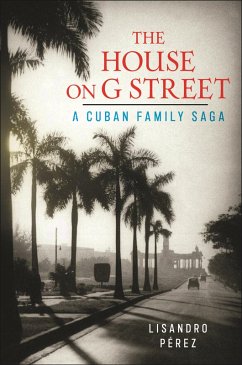The unforgettable story of a family swept into history by the Cuban Revolution
In The House on G Street, award-winning author Lisandro Pérez tells Cuba's story through the lens of a single family: his own. His book relays the tales of two officers who fought against the Spanish for Cuban independence; a plantation owner who smuggles himself onto a ship; families divided by political loyalties; an orphaned boy from central Cuba who would go on to amass a fortune; a fatal love triangle; violence; and the ever-growing presence of the United States. It all culminates with an unforgettable portrait of a childhood spent in a world that was giving way to another one. The House on G Street is a unique depiction of one of the most consequential events of the twentieth century, told through generations of ancestors whose lives were shaped by dramatic historical forces.
Pérez disentangles the complex history by following his family's thread, imbuing political events with personal meaning. Their story begins with emigration to Cuba and follows the waning years of the colony. The end of Spanish rule gives way to pervasive American influence, and Perez's family turned to New York as they adapted to the realities of a new republic with compromised sovereignty: privileged educations in boarding schools in Long Island and the Hudson Valley; a family business that took tobacco leaves from the soil of central Cuba to the docks of the East River; and grandparents who met and fell in love one night in the Upper West Side of Manhattan. His family learned to navigate the uneasy relationship between the United States and Cuba, a relationship that was destined to end in dramatic fashion.
More than sixty years later, the Cuban Revolution resists receding into the past, sparking continued discussion, debate, and reinterpretation. There is a great deal that is known about the broad historical conditions that inexorably pushed Cuba towards revolution, but much less is known about the people who lived that dramatic history. It is a story that, if not recovered and told, will be lost, for Pérez's ancestors lived in a world that no longer exists, swept away by a tide of revolutionary change.
The House on G Street follows a family whose lives mirror the history of a nation. The result is a compelling blend of memoir and in-depth historical research, a remarkable new view of the path to revolution as seen from the first person.
In The House on G Street, award-winning author Lisandro Pérez tells Cuba's story through the lens of a single family: his own. His book relays the tales of two officers who fought against the Spanish for Cuban independence; a plantation owner who smuggles himself onto a ship; families divided by political loyalties; an orphaned boy from central Cuba who would go on to amass a fortune; a fatal love triangle; violence; and the ever-growing presence of the United States. It all culminates with an unforgettable portrait of a childhood spent in a world that was giving way to another one. The House on G Street is a unique depiction of one of the most consequential events of the twentieth century, told through generations of ancestors whose lives were shaped by dramatic historical forces.
Pérez disentangles the complex history by following his family's thread, imbuing political events with personal meaning. Their story begins with emigration to Cuba and follows the waning years of the colony. The end of Spanish rule gives way to pervasive American influence, and Perez's family turned to New York as they adapted to the realities of a new republic with compromised sovereignty: privileged educations in boarding schools in Long Island and the Hudson Valley; a family business that took tobacco leaves from the soil of central Cuba to the docks of the East River; and grandparents who met and fell in love one night in the Upper West Side of Manhattan. His family learned to navigate the uneasy relationship between the United States and Cuba, a relationship that was destined to end in dramatic fashion.
More than sixty years later, the Cuban Revolution resists receding into the past, sparking continued discussion, debate, and reinterpretation. There is a great deal that is known about the broad historical conditions that inexorably pushed Cuba towards revolution, but much less is known about the people who lived that dramatic history. It is a story that, if not recovered and told, will be lost, for Pérez's ancestors lived in a world that no longer exists, swept away by a tide of revolutionary change.
The House on G Street follows a family whose lives mirror the history of a nation. The result is a compelling blend of memoir and in-depth historical research, a remarkable new view of the path to revolution as seen from the first person.
Dieser Download kann aus rechtlichen Gründen nur mit Rechnungsadresse in A, D ausgeliefert werden.









